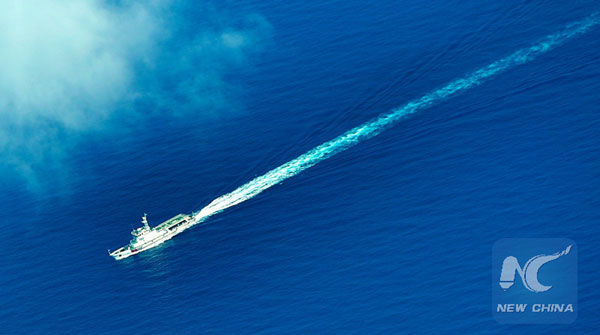


An aerial photo taken on Sept. 25, 2015 from a seaplane of Hainan Maritime Safety Administration shows cruise vessel Haixun 1103 heading to the Yacheng 13-1 drilling rig during a patrol in south China Sea. [File Photo: Xinhua/Zhao Yingquan]
The disputes over the South China Sea between China and the Philippines are not appropriate for a judicial settlement or arbitration, experts said Monday.
An arbitral tribunal's decision to allow a case unilaterally initiated by the Philippines is also highly questionable, according to a group of leading experts on international law who concluded a seminar here.
"Because there are so many possible choices regarding how to settle the claims, it will be difficult for a court or an arbitral tribunal to make a proper decision," said Sienho Yee, chief expert at the Institute of Boundary and Ocean Studies of Wuhan University, who presented a conclusion of some 30 experts during a press briefing.
"We also heard the positions by the experts that the tribunal seemed to be manipulating words in its decision (on jurisdiction)," Yee said, noting that the tribunal did not respect China's explicit right to exclude territorial and delimitation disputes written in the United Nations Convention on the Law of the Sea (UNCLOS).
Pemmaraju Sreenivasa Rao, former chairman of the UN International Law Commission, said the tribunal has put itself in a very difficult position.
"The tribunal said it would not try to settle sovereignty disputes, but only to determine geological features. However, the Philippines' claims will eventually lead to the question of who owns it, and the tribunal has no jurisdiction over this matter," said Rao, who participated in the third UN Conference on the Law of the Sea from 1973 to 1982 that led to the adoption of the UNCLOS.
Rao's opinion was echoed by Abdul G. Koroma, a former judge of the International Court of Justice who also took part in the historic conference.
"It is stated in the convention that a tribunal will not be entitled, will not have the right to pass judgment on a territorial and boundary dispute, because it has not been equipped; it has not been given competence to do so," Koroma said. "You cannot use the jurisdiction of one to determine the other."
"It's like someone who has a brain tumor and went to the doctor, and only asked for flu medication. We all know that it is not going to cure his headache," Michael Sheng-ti Gau, a professor of public international law at the Law of the Sea Institute at Taiwan's Ocean University, commented on the Philippines' claims in the case.
The claims of the Philippines only scratch the surface, but do not cover the core dispute, which is a sovereignty issue. As the court cannot rule on something that is not presented in the claims, the result of the arbitration is unlikely to have any effect on the current situation, Gau said.
The experts from Asia, Africa, the United States and Europe exchanged views on the case at the seminar, co-organized by Leiden University's Grotius Center for International Legal Studies and Wuhan University's Institute of Boundary and Ocean Studies.
 Five made-in-China hi-tech breakthroughs
Five made-in-China hi-tech breakthroughs Beijing Style: Hot pants
Beijing Style: Hot pants HK-Zhuhai-Macao Bridge to open to traffic
HK-Zhuhai-Macao Bridge to open to traffic China opens its first combined transport service to Nepal
China opens its first combined transport service to Nepal Students take stylish bikini graduations photos
Students take stylish bikini graduations photos Charming dancing students pose for graduation photos
Charming dancing students pose for graduation photos Guizhou, Yunnan section of Shanghai-Kunming railway connected
Guizhou, Yunnan section of Shanghai-Kunming railway connected Naked models transformed into landscapes, birds and even DRAGONS by body painting artist
Naked models transformed into landscapes, birds and even DRAGONS by body painting artist World’s biggest cruise ship Harmony of the Seas to start maiden voyage
World’s biggest cruise ship Harmony of the Seas to start maiden voyage Top 20 hottest women in the world in 2014
Top 20 hottest women in the world in 2014 Top 10 hardest languages to learn
Top 10 hardest languages to learn 10 Chinese female stars with most beautiful faces
10 Chinese female stars with most beautiful faces China’s Top 10 Unique Bridges, Highways and Roads
China’s Top 10 Unique Bridges, Highways and Roads China enters new space era
China enters new space era US pressure spurs closer Sino-Russian ties
US pressure spurs closer Sino-Russian ties Cliff village's survival hinges on a manmade water channel
Cliff village's survival hinges on a manmade water channel Visual effects no longer enough to attract Chinese filmgoers
Visual effects no longer enough to attract Chinese filmgoersDay|Week